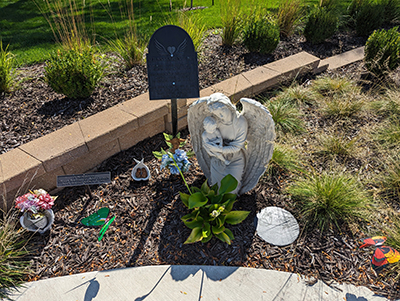Pregnancy Loss and Bereavement
The unexpected death of an unborn baby can be difficult, no matter where you are in your pregnancy. If you experience pregnancy loss, our compassionate team will help find the cause of your miscarriage and connect you to the care options — and support services — you need.
Symptoms of Pregnancy Loss
Each pregnancy loss has unique symptoms. Call your doctor if you have vaginal bleeding or no longer feel fetal movement. These symptoms don’t always mean pregnancy loss. In fact, vaginal bleeding is common during pregnancy. But it’s best to see your doctor right away to confirm.
Sexual intercourse and high-intensity exercises like jogging and cycling do not cause miscarriage.
Vaginal Bleeding
Vaginal bleeding can vary from spotting to heavy bleeding with clots and cramps. Most women who have vaginal bleeding in the first trimester have successful pregnancies.
Many factors may cause spotting or vaginal bleeding during early pregnancy, including:
- Ectopic pregnancy (embryo attaches outside the uterus)
- Infection
- Polyps, fibroids or other growths on reproductive organs
- Problems with the cervix or how the placenta attaches to the uterus
- Routine bleeding around the time of your monthly period
- Sexual intercourse
Contact your doctor if you have vaginal bleeding, so they can find the cause. Your provider may perform a pelvic exam and an ultrasound. They also may draw blood to check for infection and human chorionic gonadotropin (hCG) levels. The hCG is a hormone the placenta produces and helps your body establish and maintain a pregnancy.
Caring for Vaginal Bleeding
If you have vaginal bleeding, your doctor may recommend that you:
- Abstain from having sex
- Avoid alcoholic drinks
- Postpone traveling
- Quit smoking
- Rest
- Take only approved medications
- Use panty liners or pads
Threatened Miscarriage
Threatened miscarriage is when you have vaginal bleeding, but your cervix hasn’t begun to dilate. People with threatened miscarriage pregnancy often go on without any further problems. Call your doctor if you think you’re experiencing a threatened miscarriage.
Miscarriage Care & Treatment
Should you miscarry, it’s important to understand you didn’t cause it. A miscarriage happens when the fetus isn’t developing correctly, not because of anything you did. Depending on how far along you are in your pregnancy, you may be able to choose the type of miscarriage treatment you get.
Wait & See
During a miscarriage, you will have heavy bleeding and cramps. It’s normal to bleed enough to soak a full pad in one hour. Call your doctor or go to the closest emergency room if:
- You experience trickles of blood for more than three minutes when you sit on the toilet
- You feel lightheaded
- You soak one pad per hour for at least three hours
- You soak your bed linens with blood
- Your thinking isn’t clear
Dilation & Curettage (D&C)
During a D&C, the doctor opens or dilates your cervix (the opening to your uterus) and removes the pregnancy tissue. You'll receive anesthesia and likely go home the same day.
Medicine
With this option, you take medicine either by mouth or vaginally that causes the uterus to cramp and empty. Your doctor also may recommend taking medication before a D&C.
After a Miscarriage
Following pregnancy loss, the body can take weeks to return to normal. Your breasts may be tender, and your milk may come in. Cramping may continue for several days. You also may see bleeding or spotting for at least a week.
The postpartum period can last up to year after a miscarriage.
During this time, it’s normal for all family members to experience grief. We have resources that can help.
Infant Bereavement
 For parents who find out their baby may not live long after birth or may be stillborn, we offer support services and resources to help. Your nurse will connect you with our maternity care infant loss and bereavement team.
For parents who find out their baby may not live long after birth or may be stillborn, we offer support services and resources to help. Your nurse will connect you with our maternity care infant loss and bereavement team.
Walk to Remember
Each fall, our maternity care infant loss and bereavement team invites families and friends who have experienced the loss of an infant or child to attend the Walk to Remember event.
Autumn's Garden of Hope
In 2016, NKCH dedicated a peaceful sanctuary on campus that serves as a place of hope, healing and remembrance for families who have loved and lost a little one. Autumn's Garden is located near the east hospital drive, just south of the visitor parking garage, and is available all year round.
Additional Bereavement Resources
Baby Loss Resources in Kansas City
Infant Loss Resources
Missouri SIDS Resources
Share Pregnancy & Infant Loss Support - Missouri
Solace House Center for Grief and Healing
Support in Motion - how movement supports healing.
The Compassionate Friends - Johnson County or Eastern Jackson County
You Made Me Mom - support group for moms who have lost babies
Future Pregnancies
The death of a baby isn’t easy. It’s often very painful. Afterward, the future may seem uncertain, especially as you consider whether to try to get pregnant again. Understand that you’re not alone, and there is a community of support to help you get through your grief.
Most women who miscarry have healthy pregnancies later. Ask your doctor any questions you have about getting pregnant again. They can help you plan for future pregnancies if needed.